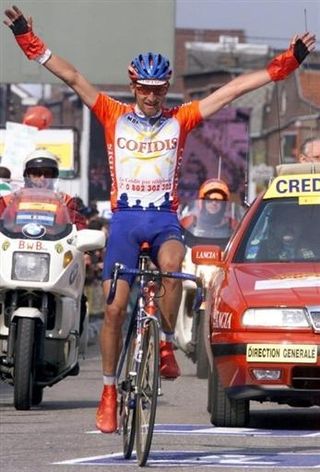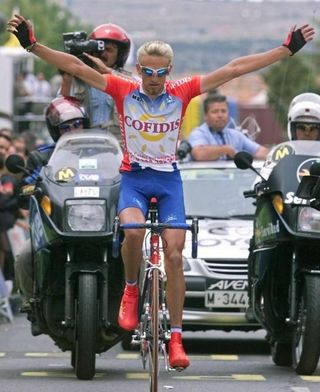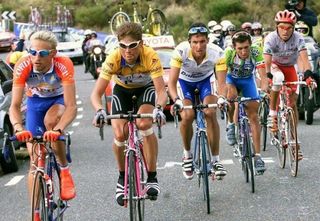Vuelta a España iconic stages: Vandenbroucke and the '99 race
When VDB was the king of the world





Frank Vandenbroucke's two stage wins in the last week of the 1999 Vuelta a España were two of the most imposing performances of his career and among the most outrageous feats of his era, Daniel Friebe reflects.
The retired Italian rider, Nicola Miceli, really ought to have fond recollections of the 1999 Vuelta a España. In the second week, Miceli was riding as well as at any point during his career, twice finishing mountain stages in the top three. And, yet, at the same time, Miceli felt like packing up and going home.
"That Vuelta a España was the only time in my career that another rider made me lose the will to race my bike. I'm talking about Frank Vandenbroucke," Miceli says, for the avoidance of any ambiguity. "He'd be coming back to the hotel in the small hours, with a girl, possibly drunk, and then going and killing us all on the road the next day. You know, you train hard, you go a month without sex before a grand tour - because you tell yourself that's what it takes - then you see that. It makes you think, 'What am I even doing here?'"
The annals record that Jan Ullrich won the 1999 Vuelta, but for most who were there - like Miceli - the race was in equal measures memorable and traumatic on account of Vandenbroucke's performances. The late enfant terrible of Belgian cycling won two stages, to Teruel and Ávila, and in the final ten days rode the the entire peloton, Ullrich included, into beleaguered, awestruck submission. Fifteen years on, what El País called a "demonstration" stands as a mawkish monument to VDB's tragically short career and life, and an era that professional cycling hasn't yet worked out how to remember or forget.
The 24-year-old Vandenbroucke had started the 1999 season, his first at Cofidis, in a similar vein, winning the GP La Marseillaise, Het Volk, stages of La Ruta del Sol and Paris-Nice and then Liège-Bastogne-Liège. On the eve of La Doyenne, he had told journalists the number of the house on the Côte de Saint Nicolas in front of which he would launch his decisive attack. He got just one thing wrong: he had also told reporters that the defending champion, Michele Bartoli, would finish runner-up. In fact the rider who won the race for second was Michael Boogerd, a distant 30 seconds in arrears of VDB.

Photo: AFP
For just over a fortnight, Vandenbroucke was hailed as the new king of Belgian cycling. A future Tour winner. Maybe another Eddy Merckx. He was then unceremoniously yanked off his cloud by a doping investigation targeting his French doctor cum guru, Bernard Sainz or "Doctor Mabuse" as he was known in the peloton. "I was naive but not dishonest. Sainz told me he was giving me homeopathic medicine," Vandenbroucke pleaded in a press conference. His team and the authorities believed him - or at least pretended to.
Get The Leadout Newsletter
The latest race content, interviews, features, reviews and expert buying guides, direct to your inbox!
In July, while Lance Armstrong romped to the first of his fictitious Tour de France victories, Vandenbroucke stewed. His fiancée, Clothilde, had given birth to a son in February. That summer, on the day when they went to book the wedding venue, Frank called it all off. "I don't know how life would have turned out if the Sainz affair hadn't blown up," he said in a BelgaSport documentary about his 1999 season years later. "Before that I was a little angel. After it I was a different person. I felt like a wild boar being hunted by a pack of dogs. That was the start of my addiction to a lot of drugs, [which I took] to take my mind off things. The two months after May 1999 were so destructive because the [addiction] mechanism was up and running."
In the eye of the storm, he could think of only one way to save himself: he would get back on his bike, start training, and win the world championships in Verona at the end of the season. He raced for the first time in nearly three months at the GP Plouay, and even attacked once or twice en route to ninth place. He then drove to Paris for a secret meeting with Sainz the following morning, in a dark corner of a bar-tabac. "I want to win the world championships," he told Sainz. "Doctor Mabuse" assured Vandenbroucke that he had just the recipe.

Photo: AFP
The Vuelta was to start in Murcia. VDB reported for duty with just two jerseys in his suitcase, thinking that he might only stay a week. Yet on the first hilly stage to Cuidad Rodrigo, to everyone's astonishment including his own, Vandenbroucke's platinum blonde pompadour appeared over the brow of the first-category Alto del Portillo in the group of GC contenders. He would end up botching his sprint and crossing the line in third place, behind Jan Ullrich and Abraham Olano. But as he slammed his bars in frustration, Vandenbroucke glanced to his right, felt his gaze lock and his heart lurch. She was tall, she had long brown hair, she came from Italy, and her name - he would soon find out - was Sarah Pinacci. "I had seen the woman of my life," he said later.
Sarah was working for the Saeco team in a public relations role. Outside the team bus, every morning, she would stand behind the controls of a Saeco espresso machine, handing out coffees to riders, guests of the team and journalists. The following day, naturally, Vandenbroucke stopped by to say hello. His Italian team-mate, Max Lelli, made the introduction. Franck thought that Sarah was cold. He didn't care; it was a "coup de foudre" - a lightening bolt - love at first sight. That evening, one of the Cofidis soigneurs, Françoise Denercke, found him bouncing hysterically on his bed and squealing with delight about "the woman of his dreams".
Sainz had wanted him to do ten stages, no more. Vandenbroucke asked for the "doctor's" permission to stay for eleven, then twelve, then thirteen and fourteen. "I can't feel the pedals," VDB told him. Sainz wasn't amused. But nothing he could say was going to make Vandenbroucke leave. Not because the last week of the Vuelta was a rite of passage towards Verona; much more simply because staying in Spain meant seeing Sarah.
They found themselves around the same dinner table at an event in Valencia on the night of the 15th stage. "Tomorrow, I'm going to win the stage for you," Frank said. Sarah sniggered. He wasn't joking.
These were the days before the widespread use of power monitors in races, before armchair wattage estimates. Neither, though, were required to tell us that Vandenbroucke's was a staggering exhibition, even by the rocket-fuelled standards of the EPO-era. Having instigated an early break after just 20 kilometres, he left all except the Spaniard Jon Odriozola floundering with an irresistible acceleration into a headwind, in the big ring, on a third-category climb 55 kilometres from the finish in Teruel.
With their gap growing to several minutes, Odriozola's Banesto team car drew alongside the pair. "How much for the win?" Banesto's directeur sportif asked Vandenbroucke. Vandenbroucke replied that he would think about it. Five or six kilometres later, with the wind gusting across the road, VDB upped the pace again. Odriozola was now barely clinging on. Vandenbroucke looked over his shoulder to see his breakaway companion panting and his Banesto directeur sportif gesticulating angrily. "Tell you what," he called across. "Give me what you said you would and I'll let your man finish second."
The offer was apparently accepted.
The finish-line bouquet went to Sarah. The next day, he had decided, he would definitely quit the race. She didn't understand. He tried to explain, kissed her for the first time, and said goodbye. Only Vandenbroucke didn't leave. The next morning he took his place on the start-line in Bronchales.
Two days later, Vandenbroucke was still at the Vuelta, much to Sainz's consternation. He almost won again atop the Alto de Abantos on stage 19, but was mainly preoccupied by how, where and with whom he was going to spend that evening. Saeco were in a hotel in central Madrid, over an hour's drive from where Cofidis were staying. Vandenbroucke eventually persuaded his masseur, Freddy Viane, to take him in the car. They arrived at midnight, and Viane told VDB that he would give him an hour. While Viane waited in reception, Vandenbroucke told Sarah in throes of passion that, the next afternoon, in Ávila, he would bring her another bouquet.
What followed a few hours later on the roads over the Sierra de Guadarrama was, if anything, even more impressive than what Vandenbroucke had done at Teruel. With 15 kilometres to go and the famous cobbled climb around the Ávila city walls lying in wait, Vandenbroucke's voice crackled over his directeur sportif, Alain Deloeuil's, intercom radio. Deloeuil duly began briefing him, only to be interrupted. "Alain," Vandenbroucke said, "I'm going to win anyway, so you just tell me how you'd like me to do it."
Having decided to prolong the excitement, two kilometres out, Vandenbroucke clattered onto the cobbles in an eight-man group containing the race leader, Ullrich, José Maria Jiménez, Pavel Tonkov and Leonardo Piepoli, among others. ONCE'S Mikel Zarrabeitia was the first to attack; Vandenbroucke blew past him like a cruise missile. Commentating for Sporza, the voice of cycling in Belgium, Michel Wuyts, laughed himself speechless. With 900 metres to go, Vandenbroucke was already turning to look back down the road and raising a fist in celebration. "Pure power, pure elegance, his bike just gliding over the surface," swooned Luis Gómez in El PaÍs the next day. "The best rider in the world," Wuyts had called him as he crossed the line.
Sarah now didn't know what to say. She, too, was lost for words. Vandenbroucke himself would later come almost to regret what he called "a moment of total euphoria". "It was disconcertingly easy," he told the 2008 BelgaSport documentary. "That was maybe the drama. It was too easy. It caused me a lot of problems afterwards. Dominating a race like that, dominating a sport like that, wasn't exactly the ideal thing for me."

Photo: AFP
In the immediate term, too, his pair of stage wins at the Vuelta and the manner in which they were achieved perhaps didn't help. From Spain, he flew with Sarah and Max Lelli to Lelli's villa in Tuscany, where the two Cofidis team-mates planned to prepare for Verona. Most mornings, though, Lelli would knock on the door to the lovebirds' bedroom, tell Frank that it was time to go training, and hear only giggles, excuses, or the bold announcement: "I don't need to train".
In Verona, sure enough, VDB was still purring….at least until a crash early in the race left him nursing a broken wrist. In intense pain when he stood on the pedals or pulled on the bars, Vandenbroucke nonetheless managed to attack on the final climb, on the final lap. The Verona circuit was, however, too benign and Vandenbroucke too badly handicapped to stay away. An unknown Spaniard named Óscar Freire was the beneficiary and the 1999 world champion.
Exactly ten years later, Vandenbroucke was seen at a race, the 2009 Worlds in Mendrisio, for the last time. He was working as a columnist for a Belgian newspaper, his career as a rider having slowly, sadly fizzled out over the previous decade, like his relationship with Sarah.
"I'm a bit like a cat. I've had more than a few lives, yet here I am, happier and more serene in my heart than at any other time of my life. I'm rediscovering myself and, as I do, I'm discovering a fantastic person," he told me in Mendrisio.
Three weeks later, Frank Vandenbroucke was dead. And the 1999 Vuelta, Teruel, Ávila and all of that seemed an awfully, tragically long time ago.
Most Popular


